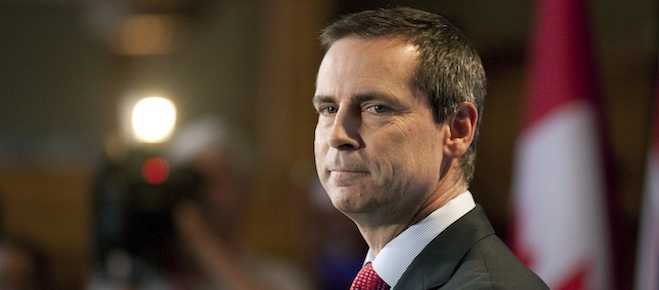The premier, the power plant, and the people
So McGuinty scrapped the plant. In a democracy, the voters have the last word.
Ontario Premier Dalton McGuinty, right, is pictured at a news conference at Queens Park in Toronto on Friday, June 15, 2012. The premier spoke to reporters about his threat to call for an election over the Ontario budget. THE CANADIAN PRESS/Chris Young
Share

Adam Goldenberg is a Kirby-Simon Fellow at Yale Law School. He was chief speechwriter to Michael Ignatieff and served as a senior aide in the McGuinty government. Follow him on Twitter at @adamgoldenberg.
Ontario’s premier is in a pickle.
Nine months ago, Dalton McGuinty was gunning for his third mandate, in the final days of a campaign he had been expected to lose. Four seats could make the difference, and precisely that many hung in the balance between Mississauga and Etobicoke—where the Liberals’ plan to build a gas-fired power plant had proved as popular as coal at Christmas.
So they scrapped it, and won a third term.
That decision, it was revealed last week, will come at a cost of $180 million—a price to be paid by taxpayers, ratepayers, or both. The government is unapologetic and the opposition apoplectic—even though, had they prevailed at the polls, they would have done the same.
Their hysteria is misplaced. If we are scandalized whenever politicians make costly promises to appeal to particular voters, then we may as well throw in the towel on democracy itself.
Our parliamentary system is comprised of single-member districts, whose representatives are accountable to their constituents. If the government makes a decision of which voters disapprove, they complain to their elected officials—who either respond to or ignore them at their peril.
In Mississauga, the system worked. The government made a decision—in this case, to build a power plant. The voters disapproved, and they said so. The government listened, if belatedly, and changed course. The voters approved. The Liberals were re-elected.
There are plenty of reasons to criticize the decision; cancelling the power plant will be costly, for one thing, and possibly inefficient for Ontario’s power grid in the long run. Construction continued long after Election Day, at an as-yet-unknown cost to the public.
But these are quarrels of substance, not form; they question the decision, not why it was made. To take issue with the latter—as opposition politicians and various pundits are now doing—is to argue with some of the basic facts of democracy itself.
Politicians make political decisions. We expect them to put the public interest ahead of their own, but until they get themselves elected, they are all but powerless to do so. Voters, meanwhile, may cast their ballots on whatever basis they choose; we do not require each other to make nuanced judgments about public policy when we go to the polls. Representative democracy works because politicians’ fortunes are tied directly to their constituents’ wishes, whatever they are. If MPPs ignore the people who sent them to Queen’s Park, they will not last long. And if respecting the will of the people helps a few elected officials keep their jobs, so be it.
Still, some politicians make hay by refusing to take populist positions on local issues. For two terms, and on the clean energy file in particular, Mr. McGuinty was one of them. To his credit, he nobly made the case against NIMBYism—“not in my backyard” sentiment—at his own political expense.
In his fourth campaign, he made an exception. But even if the think tanks and policy experts do not approve of his lapse, their votes are ultimately worth no more than those of the Mississauga residents who relentlessly opposed a power plant in their neighbourhood, and won.
Yes, the Liberals could have listened sooner, and scrapped their power-plant plans before the eleventh hour. Or Mr. McGuinty could have doubled down against NIMBYism, and repackaged the power plant as proof of his political courage.
But courage is little consolation to an unemployed ex-premier. Mr. McGuinty had to make a call, and he sided with the people—and his local candidates—over principle. In all fairness, so did his opponents.
The moral here is a simple truism: in a democracy, the voters have the last word. We should expect good policy, and demand it at the polls. But in the end, it cannot be a scandal when the voters say clearly what they want—and our representatives do as they say.